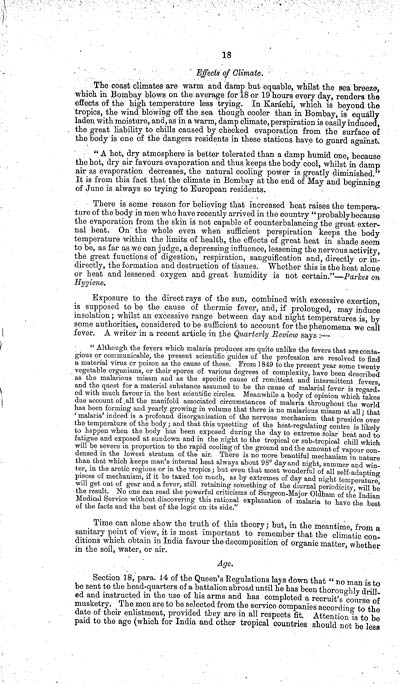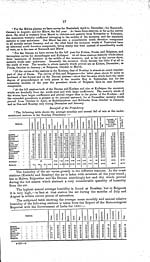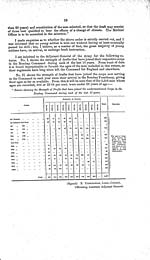Medicine - Disease > Report on enteric fever
(34) Page 18
Download files
Individual page:
Thumbnail gallery: Grid view | List view

18
Effects of Climate.
The coast climates are warm and damp but equable, whilst the sea breeze,
which in Bombay blows on the average for 18 or 19 hours every day, renders the
effects of the high temperature less trying. In Karchi, which is beyond the
tropics, the wind blowing off the sea though cooler than in Bombay, is equally
laden with moisture, and, as in a warm, damp climate, perspiration is easily induced,
the great liability to chills caused by checked evaporation from the surface of
the body is one of the dangers residents in these stations have to guard against.
"A hot, dry atmosphere is better tolerated than a damp humid one, because
the hot, dry air favours evaporation and thus keeps the body cool, whilst in damp
air as evaporation decreases, the natural cooling power is greatly diminished."
It is from this fact that the climate in Bombay at the end of May and beginning
of June is always so trying to European residents.
There is some reason for believing that increased heat raises the tempera-
ture of the body in men who have recently arrived in the country "probablybecause
the evaporation from the skin is not capable of counterbalancing the great exter-
nal heat. On the whole even when sufficient perspiration keeps the body
temperature within the limits of health, the effects of great heat in shade seem
to be, as far as we can judge, a depressing influence, lessening the nervous activity,
the great functions of digestion, respiration, sanguification and, directly or in-
directly, the formation and destruction of tissues. Whether this is the heat alone
or heat and lessened oxygen and great humidity is not certain."- Parkes on
Hygiene.
Exposure to the direct rays of the sun, combined with excessive exertion,
is supposed to be the cause of thermic fever, and, if prolonged, may induce
insolation; whilst an excessive range between day and night temperatures is, by
some authorities, considered to be sufficient to account for the phenomena we call
fever. A writer in a recent article in the Quarterly Review says:-
"Although the fevers which malaria produces are quite unlike the fevers that are conta-
gious or communicable, the present scientific guides of the profession are resolved to find
a material virus or poison as the cause of these. From 1849 to the present year some twenty
vegetable organisms, or their spores of various degrees of complexity, have been described
as the malarious miasm and as the specific cause of remittent and intermittent fevers,
and the quest for a material substance assumed to be the cause of malarial fever is regard-
ed with much favour in the best scientific circles. Meanwhile a body of opinion which takes
due account of all the manifold associated circumstances of malaria throughout the world
has been forming and yearly growing in volume that there is no malarious miasm at all; that
'malaria' indeed is a profound disorganisation of the nervous mechanism that presides over
the temperature of the body; and that this upsetting of the heat-regulating centre is likely
to happen when the body has been exposed during the day to extreme solar heat and to
fatigue and exposed at sundown and in the night to the tropical or sub-tropical chill which
will be severe in proportion to the rapid cooling of the ground and the amount of vapour con-
densed in the lowest stratum of the air. There is no more beautiful mechanism in nature
than that which keeps man's internal heat always about 98 day and night, summer and win-
ter, in the arctic regions or in the tropics; but even that most wonderful of all self-adapting
pieces of mechanism, if it be taxed too much, as by extremes of day and night temperature,
will get out of gear and a fever, still retaining something of the diurnal periodicity, will be
the result. No one can read the powerful criticisms of Surgeon-Major Oldham of the Indian
Medical Service without discovering this rational explanation of malaria to have the best
of the facts and the best of the logic on its side."
Time can alone show the truth of this theory; but, in the meantime, from a
sanitary point of view, it is most important to remember that the climatic con-
ditions which obtain in India favour the decomposition of organic matter, whether
in the soil, water, or air.
Age.
Section 18, para. 14 of the Queen's Regulations lays down that "no man is to
be sent to the head-quarters of a battalion abroad until he has been thoroughly drill-
ed and instructed in the use of his arms and has completed a recruit's course of
musketry. The men are to be selected from the service companies according to the
date of their enlistment, provided they are in all respects fit. Attention is to be
paid to the age (which for India and other tropical countries should not be less
Effects of Climate.
The coast climates are warm and damp but equable, whilst the sea breeze,
which in Bombay blows on the average for 18 or 19 hours every day, renders the
effects of the high temperature less trying. In Karchi, which is beyond the
tropics, the wind blowing off the sea though cooler than in Bombay, is equally
laden with moisture, and, as in a warm, damp climate, perspiration is easily induced,
the great liability to chills caused by checked evaporation from the surface of
the body is one of the dangers residents in these stations have to guard against.
"A hot, dry atmosphere is better tolerated than a damp humid one, because
the hot, dry air favours evaporation and thus keeps the body cool, whilst in damp
air as evaporation decreases, the natural cooling power is greatly diminished."
It is from this fact that the climate in Bombay at the end of May and beginning
of June is always so trying to European residents.
There is some reason for believing that increased heat raises the tempera-
ture of the body in men who have recently arrived in the country "probablybecause
the evaporation from the skin is not capable of counterbalancing the great exter-
nal heat. On the whole even when sufficient perspiration keeps the body
temperature within the limits of health, the effects of great heat in shade seem
to be, as far as we can judge, a depressing influence, lessening the nervous activity,
the great functions of digestion, respiration, sanguification and, directly or in-
directly, the formation and destruction of tissues. Whether this is the heat alone
or heat and lessened oxygen and great humidity is not certain."- Parkes on
Hygiene.
Exposure to the direct rays of the sun, combined with excessive exertion,
is supposed to be the cause of thermic fever, and, if prolonged, may induce
insolation; whilst an excessive range between day and night temperatures is, by
some authorities, considered to be sufficient to account for the phenomena we call
fever. A writer in a recent article in the Quarterly Review says:-
"Although the fevers which malaria produces are quite unlike the fevers that are conta-
gious or communicable, the present scientific guides of the profession are resolved to find
a material virus or poison as the cause of these. From 1849 to the present year some twenty
vegetable organisms, or their spores of various degrees of complexity, have been described
as the malarious miasm and as the specific cause of remittent and intermittent fevers,
and the quest for a material substance assumed to be the cause of malarial fever is regard-
ed with much favour in the best scientific circles. Meanwhile a body of opinion which takes
due account of all the manifold associated circumstances of malaria throughout the world
has been forming and yearly growing in volume that there is no malarious miasm at all; that
'malaria' indeed is a profound disorganisation of the nervous mechanism that presides over
the temperature of the body; and that this upsetting of the heat-regulating centre is likely
to happen when the body has been exposed during the day to extreme solar heat and to
fatigue and exposed at sundown and in the night to the tropical or sub-tropical chill which
will be severe in proportion to the rapid cooling of the ground and the amount of vapour con-
densed in the lowest stratum of the air. There is no more beautiful mechanism in nature
than that which keeps man's internal heat always about 98 day and night, summer and win-
ter, in the arctic regions or in the tropics; but even that most wonderful of all self-adapting
pieces of mechanism, if it be taxed too much, as by extremes of day and night temperature,
will get out of gear and a fever, still retaining something of the diurnal periodicity, will be
the result. No one can read the powerful criticisms of Surgeon-Major Oldham of the Indian
Medical Service without discovering this rational explanation of malaria to have the best
of the facts and the best of the logic on its side."
Time can alone show the truth of this theory; but, in the meantime, from a
sanitary point of view, it is most important to remember that the climatic con-
ditions which obtain in India favour the decomposition of organic matter, whether
in the soil, water, or air.
Age.
Section 18, para. 14 of the Queen's Regulations lays down that "no man is to
be sent to the head-quarters of a battalion abroad until he has been thoroughly drill-
ed and instructed in the use of his arms and has completed a recruit's course of
musketry. The men are to be selected from the service companies according to the
date of their enlistment, provided they are in all respects fit. Attention is to be
paid to the age (which for India and other tropical countries should not be less
Set display mode to: Large image | Zoom image | Transcription
Images and transcriptions on this page, including medium image downloads, may be used under the Creative Commons Attribution 4.0 International Licence unless otherwise stated. ![]()
| India Papers > Medicine - Disease > Report on enteric fever > (34) Page 18 |
|---|
| Permanent URL | https://digital.nls.uk/74577642 |
|---|
| Description | Dated 1883, report of typhoid fever at stations occupied by British troops in Bombay Presidency. |
|---|---|
| Shelfmark | IP/13/SB.6 |
| Additional NLS resources: | |




